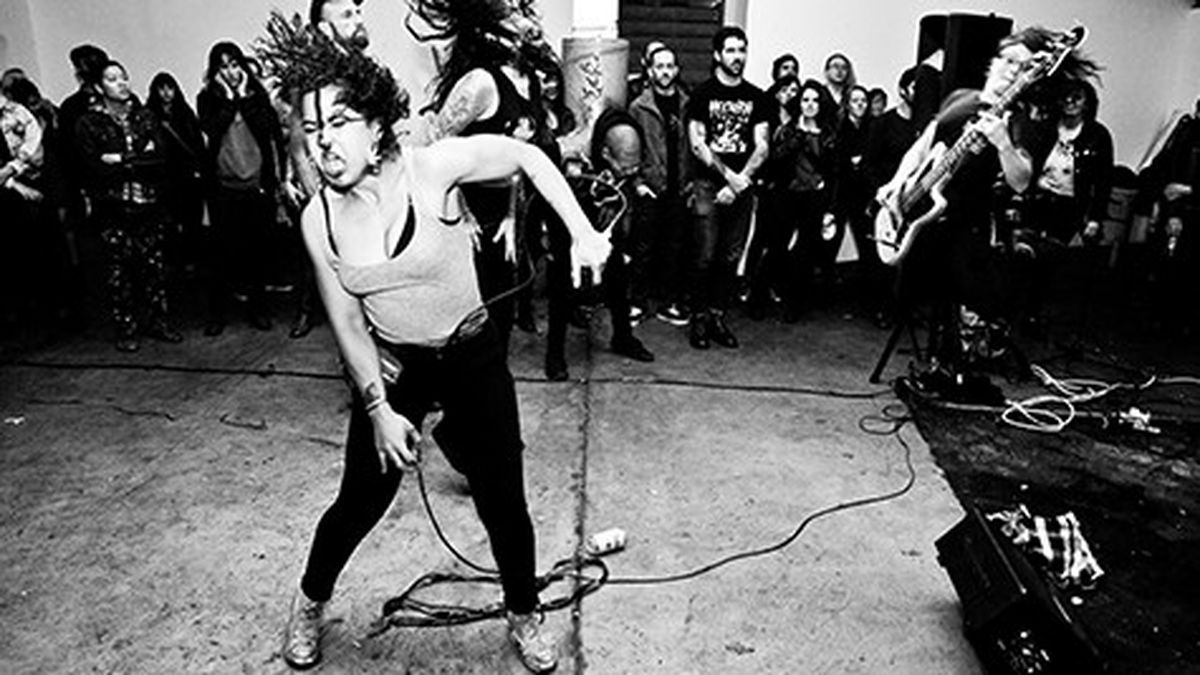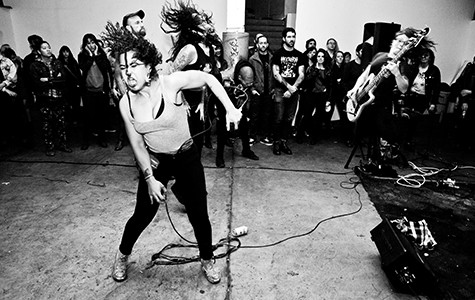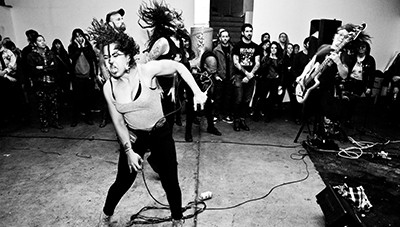The four members of Replica were surrounded by a curved row of amplifiers and the crowd. Encircled on the floor of a large West Oakland warehouse with plain white walls, the local hardcore outfit’s vocalist, Dharma Mooney, paced between songs. Then, her two-word outpour – “Erase me!” – announced the slow, turgid opening of “Dealer.” Attendees lumbered across the floor. The song accelerated. People started lunging. Mooney bristled against the crowd, which grew more agitated with each tempo uptick, and the song was over before a full minute passed. The audience rearranged itself in a ring around the band again, awaiting another screed.
The pleasure of listening to hardcore partly derives from how reliably the music fulfills expectations. Replica — whether live or on its four records, released beginning in late 2011 — excels at signaling changes (on “Dealer,” with bass spasms and abrupt pauses), and then delivering the anticipated devastation. At Replica’s recent show, Mooney crouched during builds and pounced in tandem with careening, up-tempo sections. Sometimes predictability satisfies — seeing Replica live imparts an emotional reward akin to watching the strategic demolition of a skyscraper. No matter how violently Mooney appeared to tangle with the crowd, the live environment churned according to a schedule.
“Standing on the ground makes me feel like I’m not yelling at an audience,” Mooney said. “It makes me feel like I’m yelling amongst people who have a connection with me.” Mooney, who’s in her early twenties and grew up in Oakland, stood among her bandmates on the roof of drummer B. Scot Rousse’s apartment building. Guitarist Juliana Almeida, who moved to the area from Brazil in 2011 and teaches Portuguese, sat across from bassist Alicia Arnold, a local schoolteacher.
Beast EP by ReplicaConversation revolved around the band members’ longtime involvement in the punk community and how it spills into other parts of their lives. Rousse is a philosophy teacher with an academic background. In his apartment, a bound dissertation on Heidegger rested among some of the records he’s played on, which also include works by No Statik and Scholastic Deth. “Punk is always at issue with the definition of punk,” he said. For instance, “There’s a schism in the punk scene between those who want to be avowedly political and those who want to be avowedly nihilistic.”
Punk schisms occur over much more trifling matters, too. Every conflict between opposing factions yields some dominant new notion and a slighted minority. The members of Replica spoke of what they’ve personally gleaned from punk and left room for people who drew different conclusions. If anything, being entrenched in a contentious subculture has instilled critical outlooks in the band’s members.
Of the camps mentioned by Rousse, Replica certainly isn’t nihilistic, but the band also avoided heavily politicized terms. Mooney actually described her introduction to the East Bay punk scene in her early teens as a reaction to her political upbringing. Her lyrics in Replica typically revolve around indignation or grief, and, while she said that they’re kept vague in order to be relatable, themes of inequity persist. In “Imagine Sisyphus,” the systemic disadvantages of immigrants and people of color are likened to the mythological character who’s doomed to roll a boulder up a hill and watch it fall back down.
The band described its collective identity mostly as community-minded. Replica set up the warehouse show, stationed a friend at the door to charge attendees, cleaned up afterward, and gave nearly all of the money to the touring headliner, Rakta. The previous weekend, a show at the same warehouse received noise complaints, so Replica implored the crowd to respect the space and ensured that it ended at a reasonable hour. (I attended both shows and, despite the fact that Replica’s gig appeared more chaotic, the crowd at the previous one was far less considerate of the neighborhood.)
Almeida knew the members of Rakta — a gloomy, straight-ahead punk foursome — from living in Sao Paulo. At one point during Rakta’s set, the band’s guitarist expressed her pleasure at sharing a bill with punk bands that included so many women. “In Brazil, it’s not encouraged,” she said. In Brazil in the late 1990s and early 2000s, Almeida was a member of Infect, a band comprised of women, and reckoned that there’s only been a handful of punk bands in the country with such a gender makeup since her group disbanded.
“[Infect] never had this thing like, ‘This is for the girls,'” Almeida said. “We just liked punk and hardcore and wanted to play, so why not?” She remembered the response to women playing in punk bands in Brazil as being a mix of condescension, confusion, and support. The relatively large amount of female punk musicians in Oakland was part of her inspiration for moving in 2011. The band name “Replica” appealed to Almeida because it’s a cognate for the equivalent word in Portuguese, a cultural reconciliation that reflected the dual identities of each member of the band.
Arnold, for instance, credits punk with instilling in her an instinctive suspicion of institutional hierarchy, which is tricky to maintain as a public schoolteacher. When she said, “I’m interacting with the kids and they’re free to move around in the circle,” she could’ve been describing a Replica show, but she was referring to her classroom. Arnold and her students use the same desks, all arranged in a big circle.
For Rousse, collapsing the distinctions between his roles in punk bands and academia happened gradually. In 2011, Replica played at the music festival Chaos in Tejas, right before Rousse was about to defend his PhD thesis at Northwestern University.
“I got to my defense sunburned and hungover,” he remembered. “I opened by saying, ‘I just spent the whole weekend in Austin at a punk and metal fest playing with my band. I went around telling everyone about my PhD research as a way of practicing for this here presentation, so I’m just going to go ahead and tell you what I told the punks.'”
Today, Rousse brings his experiences in bands explicitly into his lectures. When Replica was covered positively in The New York Times earlier this year, he was proud to share the article with his colleagues. As Rousse said, “Even though academia is supposed to be the zone or bastion of critical thought … it’s largely populated by total squares and conformist norms.” Incorporating his lifelong identification with punk distinguishes his scholarship from what he called the “hegemony of homogeneity.” And the reverse is true: The philosopher-academic track sharpened Rousse’s analysis of punk’s rituals and codes.
Condemnation of hierarchies and hegemonies aside, the members of Replica revere the vital quality of punk and hardcore as exhilarating styles of music. If not, they wouldn’t be such adept players. Rousse occasionally finds himself in a basement or warehouse and feels self-conscious about more than two decades spent attending punk shows. Then he remembers, “I’m doing it because it’s intense and sweaty and dirty and bloody and passionate.”















